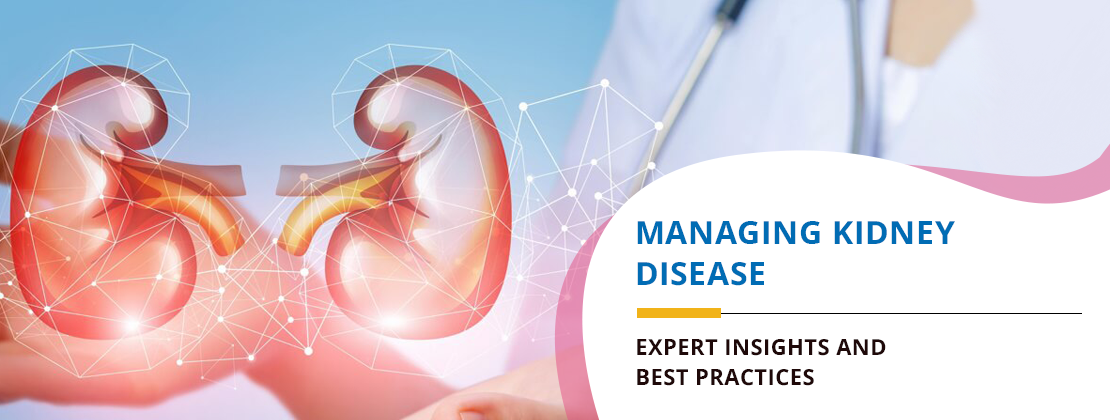
Home / Blog / Managing Kidney Disease: Expert Insights and Best Practices
When it comes to maintaining good health, the importance of our kidneys can’t be overstated. They’re vital to our body’s filtration system, helping to remove waste, control blood pressure, and keep our bodies balanced. In the world of medicine, the field that deals with the health and treatment of kidneys is known as nephrology.
Nephrology involves the diagnosis and treatment of kidney diseases, including chronic kidney disease (CKD), one of the most common renal conditions faced by millions of people worldwide. Here at HCG Hospitals, our experienced nephrologists, the doctors who specialize in nephrology treatment, are dedicated to helping patients manage and treat kidney disease effectively.
Table of Contents
Chronic kidney disease is a condition characterized by the gradual loss of kidney function over time. When the disease progresses to an advanced stage, dangerous levels of fluid, electrolytes, and wastes can build up in your body, causing a host of health complications.
If you or a loved one has been diagnosed with chronic kidney disease, it’s crucial to understand the various treatment options available to manage this condition effectively. Let’s explore these in detail.
Managing kidney disease requires a comprehensive, patient-centric approach. Depending on the severity of the disease, the treatment plan may involve medications, lifestyle modifications, or even dialysis.
Our nephrologists at HCG Hospitals emphasize patient education and preventive care. This includes providing dietary advice tailored to kidney health, known as renal nutrition, and medications to control underlying conditions such as diabetes and high blood pressure.
For some patients with chronic kidney disease, dialysis may be necessary. This treatment method mimics the function of kidneys, filtering out waste products from the blood. There are two main types of dialysis: hemodialysis and peritoneal dialysis. Our team of nephrologists at HCG Hospital, technicians & nurses will guide you through each step of the process, ensuring your comfort and safety.
HCG Hospitals has recently launched an innovative Night Dialysis Unit at our Ahmedabad facility. This unique unit allows patients to receive hemodialysis treatment during the night, providing a more comfortable and convenient option for those who are busy during the day. It’s an advanced renal care technique designed to improve the patient’s comfort and quality of life by allowing them to undergo dialysis while having a restful night’s sleep. The treatment is more accessible and easy for the patient’s body to tolerate while effectively removing waste from the blood.
In severe cases of chronic kidney disease, a kidney transplant may be the most effective treatment option. Navigating renal transplantation involves several stages, including evaluation, surgery, and post-transplant care. At HCG Hospitals, we strive to support and guide our patients throughout this journey, providing the highest standard of care every step of the way.
Living with chronic kidney disease can be challenging, but effective coping strategies can significantly improve your quality of life. Understanding your condition, taking an active role in your care, maintaining a positive outlook, and getting the necessary support can make a world of difference.
Understanding Your Condition : The first step in coping with kidney disease is gaining a clear understanding of your condition. Your nephrologist can provide detailed information about the disease and its implications. This knowledge empowers you to take charge of your health, make informed decisions, and anticipate possible complications.
Staying Organized : Keep track of your medical history, prescriptions, and lab results. This not only facilitates better communication with your healthcare team but also helps you stay on top of your healthcare routine.
Maintaining a Healthy Lifestyle: Adopting a kidney-friendly lifestyle is crucial in managing kidney disease. This includes adhering to a renal nutrition diet prescribed by your healthcare provider. Regular physical activity also plays a crucial role in maintaining your overall health and managing symptoms of kidney disease.
Emotional Wellness: Coping with a chronic illness can be emotionally taxing. It’s normal to experience feelings of sadness, fear, or frustration. Seeking psychological or emotional support can help. This can be through professional counseling or by joining support groups where you can share experiences and learn from others who are facing similar challenges.
Practicing Mindfulness and Relaxation Techniques: Practicing mindfulness and relaxation techniques such as yoga, meditation, and deep breathing exercises can reduce stress and improve your mental well-being.
Preventing kidney disease is equally important. Simple lifestyle changes such as maintaining a healthy weight, exercising regularly, quitting smoking, and controlling diabetes and high blood pressure can significantly reduce the risk of kidney disease.
Regular check-ups are crucial, as early detection of kidney disease can lead to more effective management and improved health outcomes. Remember, the sooner you take steps towards managing kidney health, the better your chances of leading a healthy life.
Early Diagnosis and Regular Check-ups: The sooner kidney disease is diagnosed, the better the chances of slowing disease progression. Regular check-ups are crucial for early detection and effective management of kidney disease.
Medication Management: Taking your medication as prescribed by your Nephrologist is key to controlling kidney disease. Ensure you understand the dosage, timing, and possible side effects of your medications.
Managing Underlying Conditions: Control underlying conditions such as diabetes and hypertension, which are known to cause kidney disease with the help of Physician & Endocrinologists at HCG Hospitals.
Diet and Nutrition: Maintaining a diet low in sodium, potassium, and phosphorus is often recommended for kidney disease patients. Consult with a dietitian who specializes in kidney disease to plan meals that meet your nutritional needs.
Staying Hydrated: Drinking an adequate amount of water helps your kidneys clear sodium, urea, and toxins from the body, reducing the risk of developing chronic kidney disease.
At HCG Hospitals, we understand the unique challenges posed by kidney disease. Our Department of Nephrology is committed to providing patient-centric, comprehensive care to all our patients. Contact us today to learn more about our state-of-the-art facilities, including our new Night Dialysis Unit, and how we can help manage your kidney health.